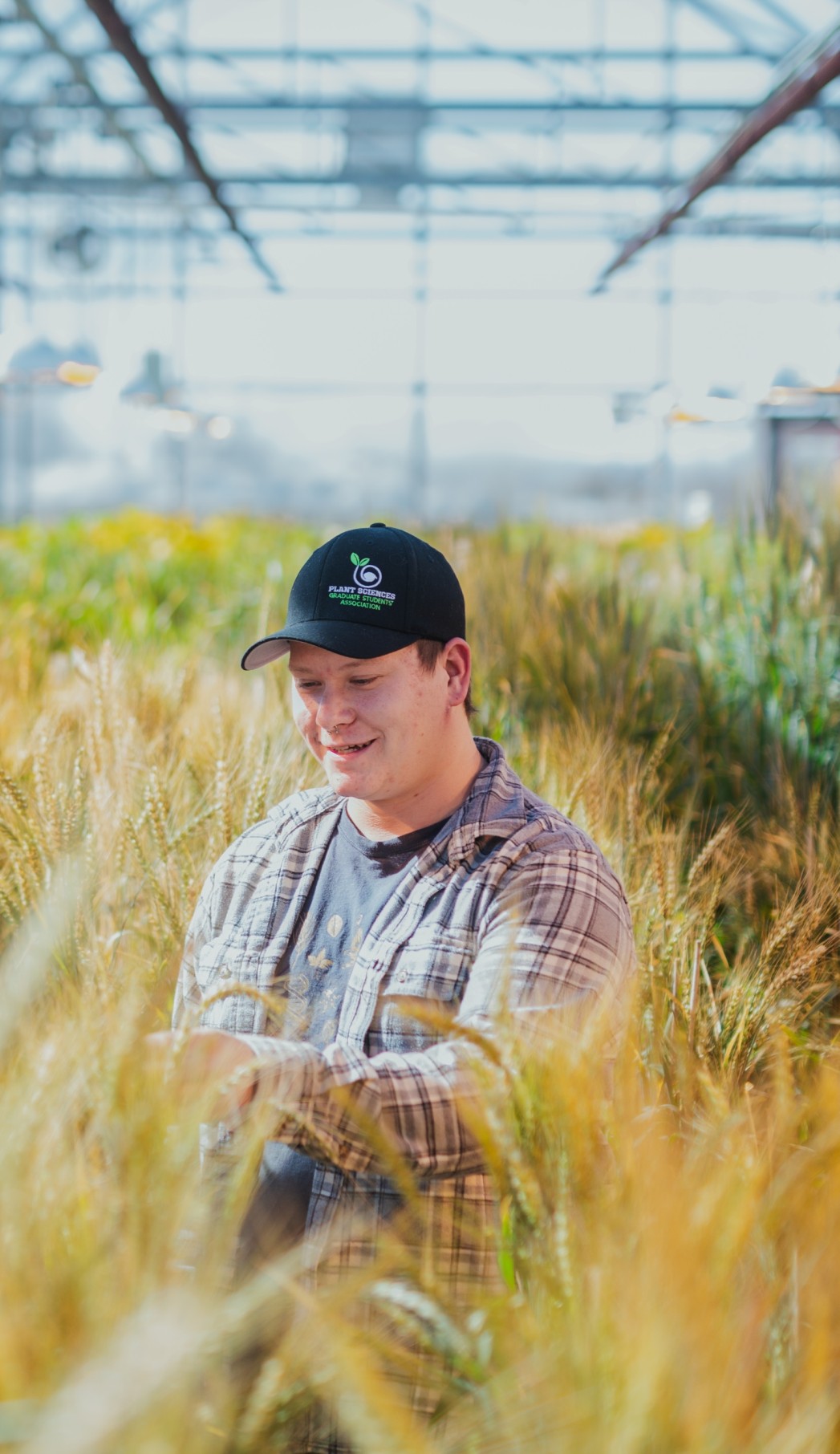
Graduate Voices: From Farm Fields to Research Fields – Jeremy Irvine’s Journey
Jeremy Irvine, a Vanier Scholar and PhD student at the University of Saskatchewan, is combining his farm roots with research in sustainable agriculture. His work on the lesser clover leaf weevil is helping reduce pesticide use, protect pollinators, and support farming communities. Beyond the lab, Jeremy is a mentor, leader, and advocate who reminds fellow graduate students that resilience and balance are key to success.
Jeremy Irvine (he/him/il), a Vanier Scholar and PhD student at the University of Saskatchewan, is advancing sustainable pest management in forage seed systems. His work focuses on the lesser clover leaf weevil (Hypera nigrirostris), a major pest in red clover seed production. By establishing economic thresholds and developing scent-based traps, he aims to reduce reliance on pesticides and protect pollinators.
His research is as personal as it is scientific. Raised on a Saskatchewan farm where he still works today, Jeremy grew up surrounded by agriculture. “Agriculture has always been central to my life,” he says. “During my BSc in Agriculture at USask, I developed a strong interest in entomology and the challenges insects pose for farmers. That combination of personal experience and academic training led me to graduate school, where I could focus on research that directly benefits farming communities.”
Jeremy’s academic journey has been recognized with some of the country’s most prestigious awards. He received the Vanier Canada Graduate Scholarship (2025), the Saskatchewan Lieutenant Governor Indigenous Scholarship (2024), and the NSERC Canada Graduate Scholarship – Master’s Program (2024). He was also offered the NSERC Doctoral Scholarship and the Indigenous Graduate Leadership Scholarship in 2025 but declined them in order to accept other funding.
Beyond the lab, Jeremy has built a strong record of leadership and advocacy. He is the past President of the Plant Science Graduate Student Association, Vice President of the Entomological Society of Saskatchewan, Department Steward for PSAC 40004, and previously served as the Student Representative on the Canadian Society of Agronomy executive.
For Jeremy, the excitement of research comes from its blend of curiosity and impact. “What excited me most was the opportunity to do something new and follow my curiosity into areas that genuinely interested me,” he reflects. “At the same time, I was motivated by the idea that my work could have real impact, supporting farmers, reducing pesticide use, and protecting pollinators. That combination of novelty and purpose made me feel like my research truly mattered.”
Graduate school, however, has not been without its challenges. Endless fieldwork, the pressure to publish, and the constant cycle of funding applications and conferences often left him stretched thin. “There are moments it feels like there’s no pause,” he admits. Balancing leadership roles and personal commitments only added to the strain. Still, Jeremy has found ways to manage. He makes time for hobbies and family, even using geofencing on his phone to silence work notifications at home. “Learning when to say no has been critical,” he says, though he acknowledges it’s not always easy to resist an interesting side project.
Support from peers, family, lab mates, and his supervisor has been central to navigating the tougher times. These experiences, Jeremy says, have made him more patient, adaptable, and empathetic. “I’ve learned to approach setbacks with more perspective instead of frustration, and that shift has shaped how I see both my research and life outside of it.”
Among his proudest achievements are his efforts in outreach and mentorship. Each year, he brings entomology programming into K–12 classrooms and volunteers at Yellow Quill First Nation career day to help reduce Indigenous underrepresentation in post-secondary. “Seeing some of the students I spoke with later on campus makes me feel like I played a small role in encouraging them to pursue post-secondary education,” he says.
Looking ahead, Jeremy hopes to continue his research in a postdoctoral position and eventually move into a faculty role. His graduate journey, he reflects, has equipped him not only with persistence and problem-solving skills, but also with the ability to communicate science across disciplines and to the public.
His advice to fellow graduate students is both practical and encouraging: “You’re not alone. Reach out for support early, celebrate small victories, and don’t forget to build a life outside your research.” Most of all, he reminds others that progress is rarely linear: “Struggling is part of the process, and everyone goes through it. What matters is finding a way to keep moving forward and leaning on the people around you when you need to.” That same resilience, grounded in both farm life and academic perseverance, continues to guide his journey toward a future in sustainable agriculture.
